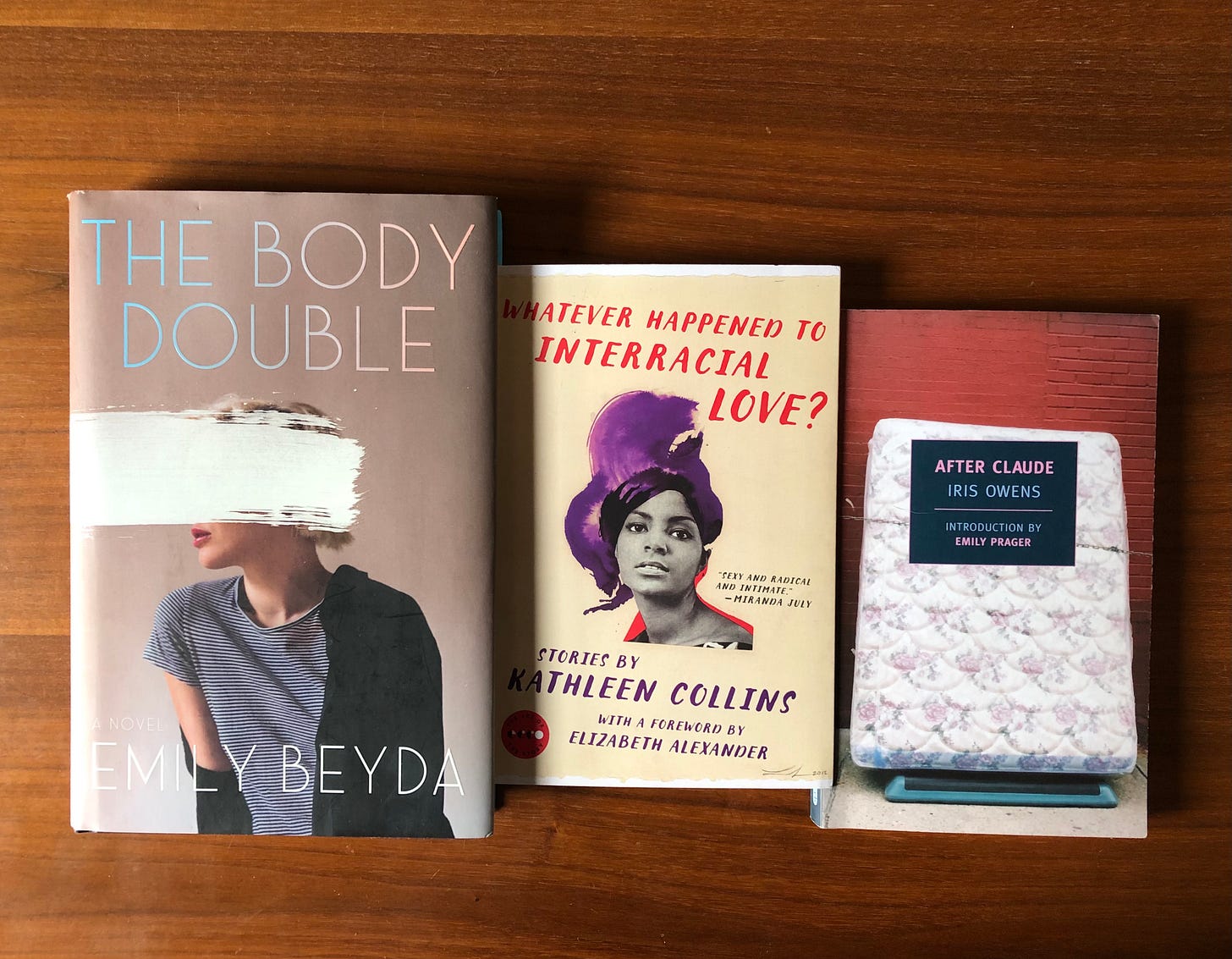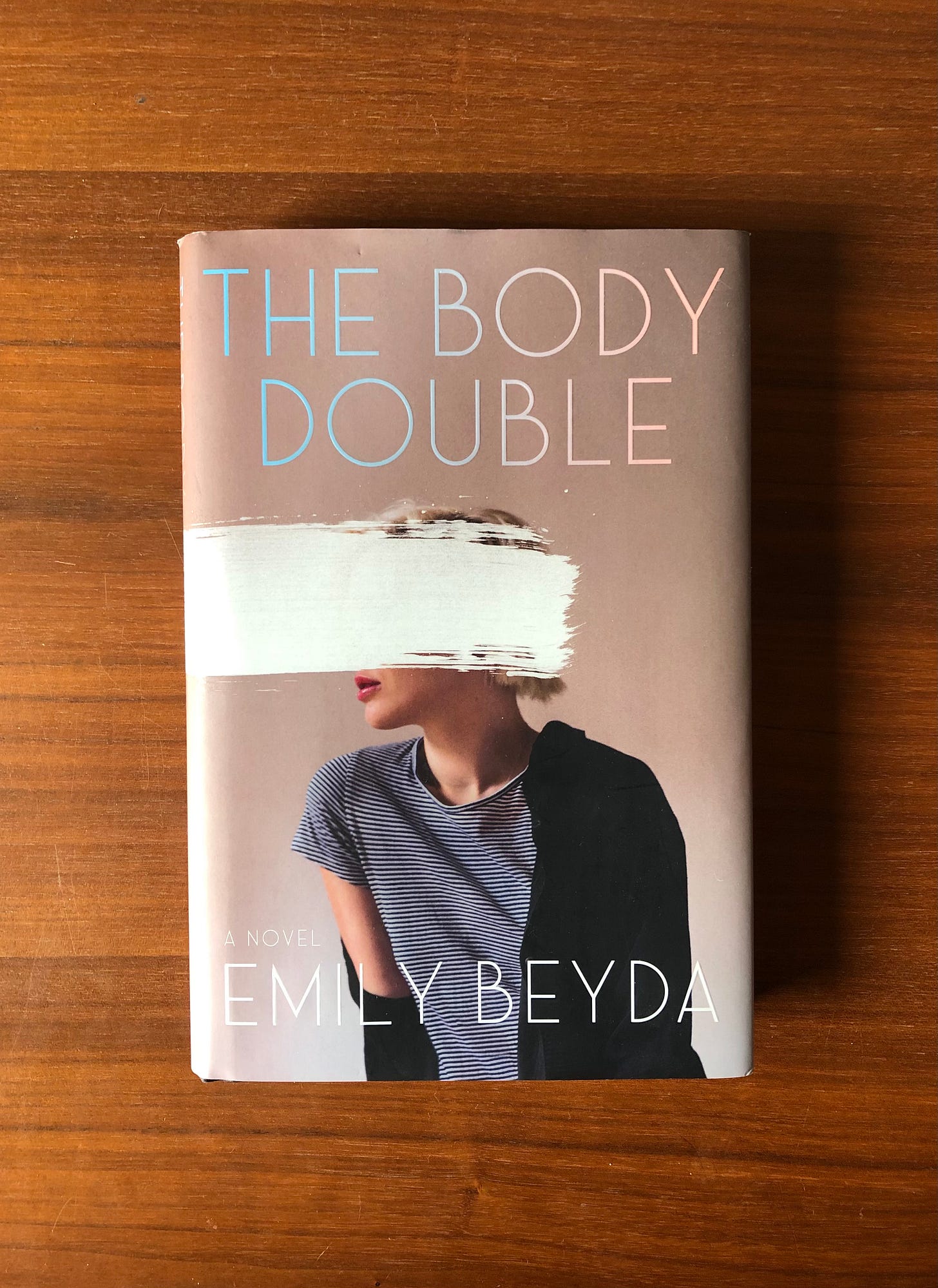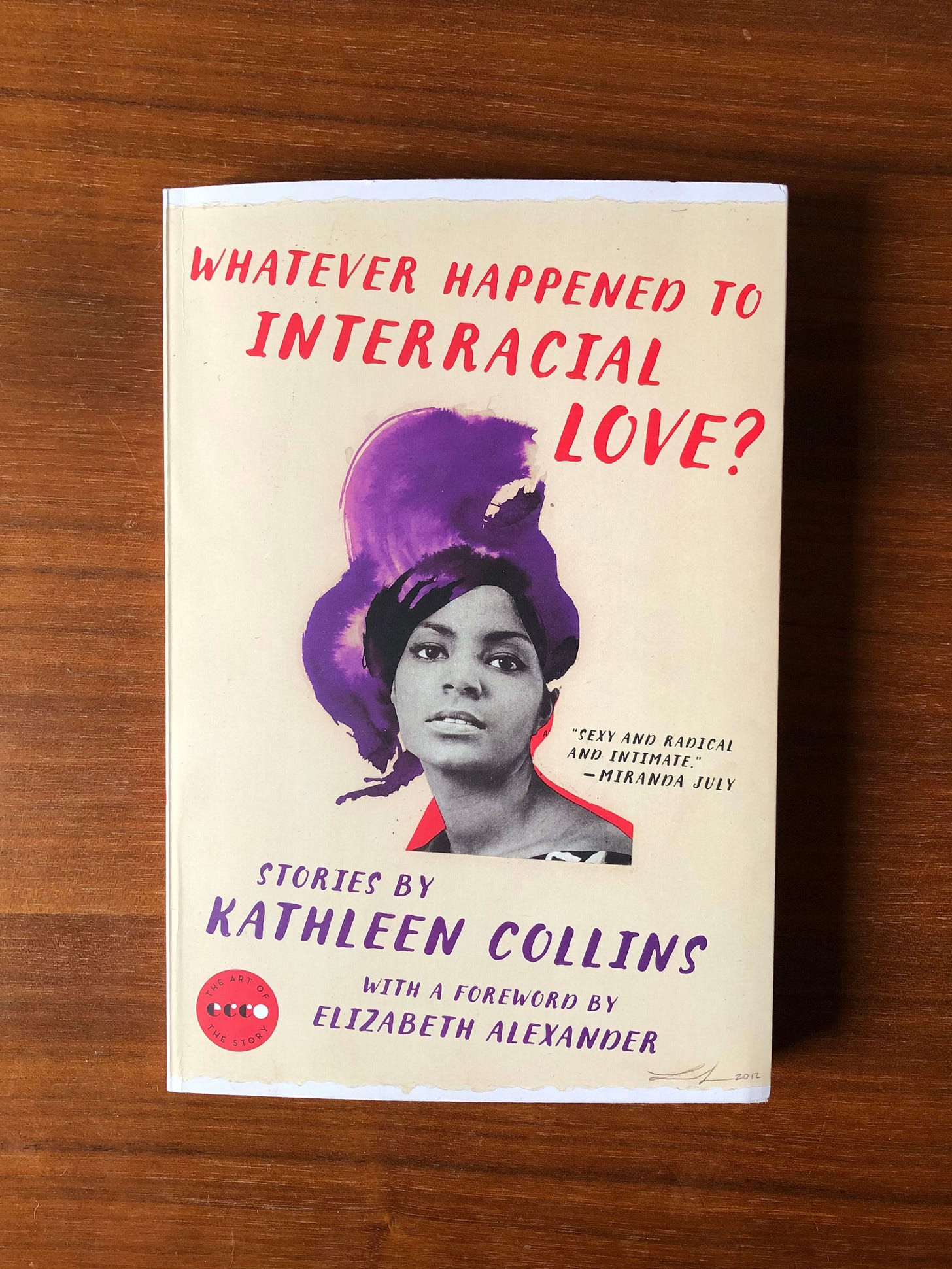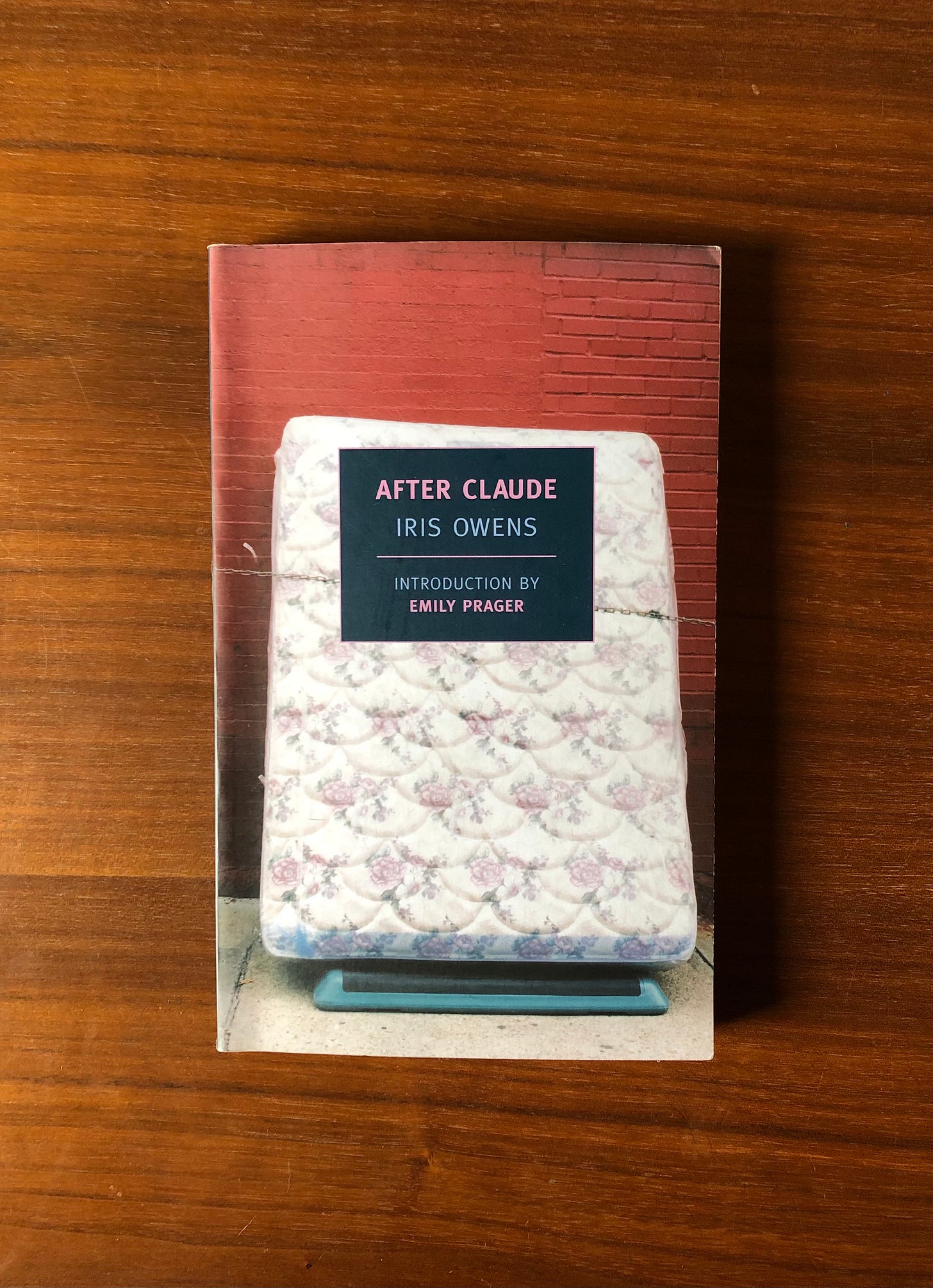Hi there!
Shirley's January 2021 newsletter = 3 more books for your TBR list
Happy 2021! Thanks for tuning in for my diatribe on the state of democracy. Ha, ha, just kidding. I’m going to be talking about these three books. 👇👇👇
But first, a question: What does it mean to feel like “yourself”?
I don’t know about you (actually, this is rhetorical), but when I express this sentiment, it’s usually in the opposite way, and temporal—as in, “I don’t feel like myself today.”
What I’m getting at is, we don’t really consider our “self” until it disappears or otherwise fails us. This can be a beautiful idea—an essence doesn’t need definition (think of je nais se quoi, that most charming of French phrases literally meaning “I don’t know what”)—but it can also be dangerous. Feeling the absence of something doesn’t exactly equate to knowing the thing itself. And it’s much easier to lose ourselves if we don’t know it’s happening until things feel very wrong—or, in some cases, until it’s too late.
This month’s Shirley picks—as always, one current, one contemporary, and one “of yore”—are all, in their own ways, explorations of self. Does that make them thought provoking? It sure does. Does it also make them twisty-turn-y, reflective journeys that are, in at least one case, hilarious? Yup, it does that, too.
So here we go: three delightful, insightful accounts of what it means to be particular humans in particular worlds.
CURRENT:
The Body Double by Emily Beyda
March 2020 (Doubleday)
This book was popping up on my radar a lot last spring because I follow its author, Emily Beyda, on social media and we overlapped at an MFA program and she is delightful. (✨✨On this note, stay tuned for a special Shirley bonus next week.✨✨) But it wasn’t until the fall, when I was finally able to browse a bookstore again and saw it on the shelf, that I remembered I wanted to read it. I’m so happy I did.
The Body Double is a wild, claustrophobic ride of a debut novel that’ll flood your brain with delight and fear. It’s also maybe the most literal exploration of self that I’ve ever read. It’s weird and beautiful and tells us the nature of celebrity without telling us the nature of celebrity. (Never imagined I’d say this but, thank you for that language, TikTok.)
The premise is simple and creepy: A young woman agrees to transform herself into a famous actress and double for her in actual life while the actress recovers from a mysterious nervous breakdown. Beyda runs with her concept as far as it’ll go and then some (hello, last chapter!). Meanwhile, the narrative is driven by prose that’s paradoxically languid and sharp—a razor blade in a haystack reverie—and the narrator’s almost uncanny interiority. As she’s figuring out where she ends and where the person she’s meant to inhabit begins, you may notice a growing suspicion that you can’t always define where you begin or end, either. What, exactly, is it that makes you you? (The way you lift a fork? The cadence of your text messages?) Come for the fun idea. Stay for the growing sense of dread.
You’ll like it if you like… its lines:
Outside, I can sense the summer air pressing against the thin glass of the doors, straining to get in, the pressure around us immense, like water at the bottom of the ocean. I wipe down the counter. I wipe down the case with the candy in it. I think again of the girl in the painting, the weight of her averted gaze, that long-ago light, so thick and heavy around her that it almost seems damp.
(How’s that for a description of stagnation and anticipation working in tandem?)
I have found I cannot trust the feelings in my body. I listen to Max when he tells me what I should consume. I don’t know what my body needs. It doesn’t belong to me anymore. Sometimes I make us lunch, standing at the open counter of our tiny kitchenette, watching Rosanna prep the same meals on talk shows or in her own much larger kitchen, my body in sync with hers, trying to move so smoothly that if Max looks at me it will be as though the screen is a mirror.
(Listen to me on this one because I used to edit stories about celebrities’ diets: This is one of the many reasons you should never follow a celebrity’s diet.)
Marie and I have the same conversations over and over, a woman addressing herself in the mirror. There is something dreamlike about it: two identical bodies slowly, gracefully, aging, our clothes, our hair, gradually evolving in concert as the world shifts around us. In the early tapes, we sit close, our knees always touching, easy with each other. Over time we move inexorably farther and farther apart. It’s like watching the slow drift of continents, an island disappearing over the horizon until there is nothing left but light and the water, an endless undifferentiated smear of blue where there used to be a world.
(I challenge you to find a more poignant description of childhood-to-adulthood female friendship that is not Elena Ferrante’s entire Neapolitan series.)
CONTEMPORARY:
Whatever Happened to Interracial Love by Kathleen Collins
2016 (Ecco)
Admittedly, it’s a bit cheeky to deem this book a contemporary pick. Yes, it was published for the first time in 2016, but the stories that make up the collection were written in the ‘70s. The author, Kathleen Collins—known more widely as a groundbreaking Black female filmmaker as well as a poet and screenwriter—died in 1988 at the age of 46. Her daughter later discovered these stories, the journal A Public Space published “Interiors” in their Fall 2015 edition, and Ecco picked up the entire collection.
As interesting as the backstory is, you don’t need it to enjoy the book, which is the best collection I’ve read recently by far. Collins is able to do that thing that only truly great short story writers can do: make the story specific-yet-universal as well as timeless (for both the characters and the reader). I’m more convinced than ever that this is possible only through the use of magic. Collins covers vast stretches of time by choosing just the right detail or moment, writes in a tense that makes the past and the future feel as present as the current, and does this pretty amazing thing where, at times, she seems to straddle the line between breaking the third wall and the fourth wall—no doubt thanks to her work in film and stage. Collins also slips between writing from the perspective of men and women, Black characters and white characters, young people and old people (sometimes within the same story) more fluently than anyone I can immediately think of—all of those characters fully formed, yet still realizing. Can I use the word “invigorating” to describe a collection? I just did.
You’ll like it if you like… its lines:
We had more in five minutes than [I had] in eleven years with Barbara. No, man, more . . . more guts, more life, more shit happening in the air between us, just more, man. If you’ve had less you know when you’ve got more, man. You say it out loud to yourself, “It’s not just me, it’s not just her, she’s not backing away, I’m not backing away. It’s a fuse; we touch the same wires.”
(I don’t know if I’ve ever heard the mysteries of attraction described better.)
“He used to write poems.” Louise sighed.
“Aw, come off it, honey,” Ellen said, and laughed. “No one’s ever seen a line! Oh, he drops his little hints. When he’s in one of his sensitive moods he alludes to quiet meanderings down poetry lane, and I say, ‘Listen, Edouardo, one of my real pleasures would be to read a bit of your quiet verse, I’d love it, believe me, I’d love it.’ Then he sighs. ‘Yes, perhaps one day we shall,’ he says, and folds that subject neatly back into his too-tight pants.”
(Was this treatise of young artists written in 1971 or 2021?)
You were very beautiful that night. . . Ramona was jealous of you. . . that gave me a weird pleasure and I fell in love with you all over again. . . I felt toward you exactly like I had when we first lived together. . . it was incredible. . . you were the same person again, and I was the same person again, and you were walking into the apartment with that smile and that glow, heating up the place. . . and I loved you so much again I was crying. . . it was so fucking real, I could smell that sweet smell you had about you when you slept. . . and I would curl up under you just to smell you because it made me feel so peaceful and happy. . . I could touch it it was so real. . . and then it was gone, and I was dancing with Ramona at my birthday party. . . and watching you blow me a birthday kiss. . . you have made do with so little. . .
(I reeeeally want to keep typing out this scene, but it’s already getting too long, so I guess you’ll have to get the book and read it yourself, because wow, it goes somewhere unexpected.)
YORE:
After Claude by Iris Owens
1973; reprint - 2010 (New York Review Books)
A couple of years ago, when you could still do such a thing, I was at a bar in a bookstore reading when someone who worked there saw what I was reading and recommended I pick up After Claude. I can’t remember what I was reading at the time to garner such a recommendation, but no matter, because it got me to this bon mot of a book. And now I get to get you to this bon mot of a book.
The delight is thanks to its narrator, Harriet, a sharp, outrageous personality with more wit than, I don’t know, someone with a lot of wit. The first chapter is so hilarious, that I’m tempted to share passages only from there (update: that’s exactly what I decided to do). When you keep reading, though, you get to see Harriet for more of who she actually is—namely, a pretty selfish and delusional human, but a pretty smart one. Before you can see through to her detachment from reality, you’re seduced by a barrage of misanthropic humor and charm, just like the people in her life would have been. One good thing about being a reader is that, even after you see through it, you still get to sit back and enjoy the mayhem with a constant refrain of Did she just say that? running through your head.
As for the ending, I’m still unsure where I stand on it and what it indicates Harriet has or hasn’t become. So why don’t you read it and let me know so we can talk about it together?
You’ll like it if you like… its lines:
I left Claude, the French rat. Six months of devotion wasted on him was more than enough. I left him as the result of an argument we had over a lousy movie, a sort of Communist version of Christ’s life, except it didn’t seem Communistic to me, whatever that is. Everyone was poor all right, and Mary didn’t sport her diamond tiara, but otherwise it was the same old religious crap about how wonderful it is to be a pauper after you’re dead.
(As far as four opening sentences go, I’d say this passage is four for four.
“Me a bore?” I laughed, amazed that the rat would resort to such a bizarre accusation. I have since learned never to be amazed at what men will resort to when cornered by a woman’s intelligence.
(Truth! Also fun to consider after you learn more about Harriet.)
“Please, come to bed,” I said.
“To bed, with you?” Claude screwed up his classic features as if he were playing games in front of a carnival mirror. “I’d rather sleep on a sewer than sleep with you!”
That business of sleeping on sewers happens to be a French tradition, so I didn’t take offense.”
(Ha! PS: Harriet would definitely be canceled in today’s world.)
“What’s bothering me is that six months have passed and you’re still here, like a leech, a parasite, destroying my apartment and my life. How long must I pay for a single act of mercy?”
His distortions, the lies he was telling himself and me, filled me with a cold fury, because, as an American, my war against injustice knows no bounds.
(Lol. It me.)
As always, thanks for reading and take care. Oh, and don’t forget: There’s a special surprise on the way. Stay tuned!
xx Kelly
In the meantime, if you liked this post, why not subscribe? I think one day you will look back at the three seconds you spent doing so with fondness for who you once were and who you eventually became and all the snacks you ate in between 🤓
And if you want to share this post with a friend—or with all of your friends and some distant relatives so you can have a great big Zoom about it where the declaration “You’re on mute, Aunt Tracy” is uttered at least twice—all the better. Books! 🤓
If you’re so inclined, you can pick up any of these books at my Bookshop.org shop. Maybe I’ll make 4 cents or something! 💰💰💰





